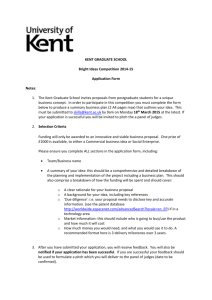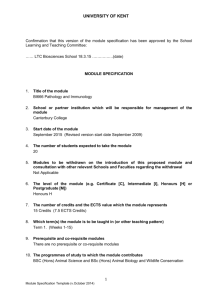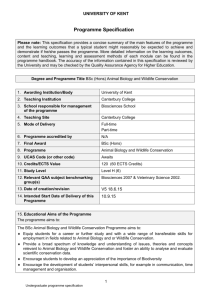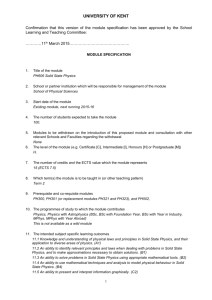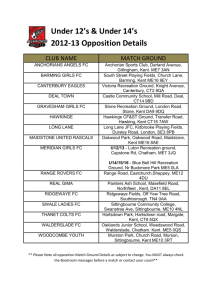Programme Specification
advertisement
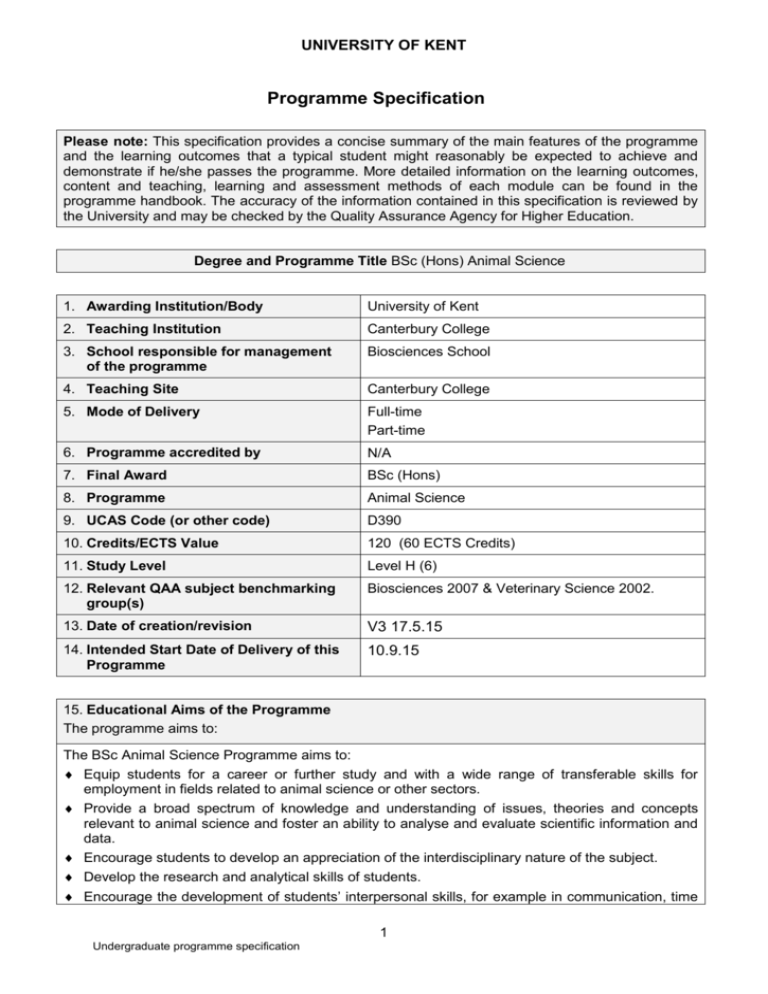
UNIVERSITY OF KENT Programme Specification Please note: This specification provides a concise summary of the main features of the programme and the learning outcomes that a typical student might reasonably be expected to achieve and demonstrate if he/she passes the programme. More detailed information on the learning outcomes, content and teaching, learning and assessment methods of each module can be found in the programme handbook. The accuracy of the information contained in this specification is reviewed by the University and may be checked by the Quality Assurance Agency for Higher Education. Degree and Programme Title BSc (Hons) Animal Science 1. Awarding Institution/Body University of Kent 2. Teaching Institution Canterbury College 3. School responsible for management of the programme Biosciences School 4. Teaching Site Canterbury College 5. Mode of Delivery Full-time Part-time 6. Programme accredited by N/A 7. Final Award BSc (Hons) 8. Programme Animal Science 9. UCAS Code (or other code) D390 10. Credits/ECTS Value 120 (60 ECTS Credits) 11. Study Level Level H (6) 12. Relevant QAA subject benchmarking group(s) Biosciences 2007 & Veterinary Science 2002. 13. Date of creation/revision V3 17.5.15 14. Intended Start Date of Delivery of this Programme 10.9.15 15. Educational Aims of the Programme The programme aims to: The BSc Animal Science Programme aims to: Equip students for a career or further study and with a wide range of transferable skills for employment in fields related to animal science or other sectors. Provide a broad spectrum of knowledge and understanding of issues, theories and concepts relevant to animal science and foster an ability to analyse and evaluate scientific information and data. Encourage students to develop an appreciation of the interdisciplinary nature of the subject. Develop the research and analytical skills of students. Encourage the development of students’ interpersonal skills, for example in communication, time 1 Undergraduate programme specification UNIVERSITY OF KENT management and organisation. Encourage students to reflect on and evaluate their learning and achievements. Promote life-long learning in a supportive environment, encouraging students from the local community to return to or continue in education. Develop a range of skills and techniques, personal qualities and attitudes essential for successful performance in working life. Enable progression to further study in related areas. 16 Programme Outcomes The programme provides opportunities for students to develop and demonstrate knowledge and understanding, qualities, skills and other attributes in the following areas. The programme outcomes have references to the subject benchmarking statement for Biosciences 2007 & Veterinary Science 2002. The Programme outcomes have been developed to reflect the FHEQ qualification level descriptors as set out in Annex 2 of the Credit Framework. A. Knowledge and Understanding of: 1. A systematic understanding of biological principles, classification systems and environmental demands relating to animal science. (SBVS 1.5) 2. A coherent knowledge of animal behaviour, responses and control, significance and importance of behaviours at least some of which is at, or informed by the forefront of aspects of animal biology and wildlife conservation. (SBVS 1.5, 2.2) 3. A systematic understanding and coherent knowledge of anatomy, reproduction and physiology of a range of animals, related principles and modern scientific techniques (SBVS 1.5, 2.2) 4. Methods of acquiring, interpreting and analysing biological information which is at, or informed by the forefront of aspects of animal biology and wildlife conservation, with critical understanding of their uses (SBVS1.5) 5. A conceptual understanding of the relationships between animals and their environment, including human-animal interaction enabling the student to devise and sustain argument (SBVS1.5) Teaching/learning and assessment methods and strategies used to enable outcomes to be achieved and demonstrated Teaching/learning Student and tutor led seminars will enhance students’ knowledge and develop their study and presentation skills. Lectures and interactive learning experiences are key tools used to support and enhance the learning experience. Tutorials will be used throughout the programme to support and enhance the learning experience. Independent and directed reading, data gathering and research will deepen students’ knowledge and understanding supporting their critical analysis and construction of argument. Assessment Students’ progress will be will be monitored and tracked throughout the programme. Students will be supported with regular tutorials to assist them to plan for success. They will be assessed using a variety of assessment methods that will be both theoretical and practical. Assessment methods include written essays, research projects, reports, time constrained assignments and examinations. Skills and Other Attributes B. Intellectual Skills: 2 Undergraduate programme specification UNIVERSITY OF KENT 1. Recognise and apply theories, concepts, principles and accurately established techniques to the study of animal science (SBB 3.2) 2. Develop a conceptual understanding that enables analyses, synthesis and critical interpretation of information (SBB 3.2) 3. Analyses of key issues and challenges, and evaluate responses, be able to make sound judgements and identify future needs (SBB 3.3) 4. Ability to research, discuss and debate the key concepts, principles and impacts of a range of aspects relating to animal science in context with particular aspects of current research (SBB 3.2) 5. Appreciation of modern clinical tests, technological developments and tools that relate to animal science (SBVS 2.3) Teaching/learning and assessment methods and strategies used to enable outcomes to be achieved and demonstrated Teaching/learning Student and tutor led seminars will enhance students’ knowledge and develop their study and presentation skills. Visits and practical events will enhance the learning experience. Lectures will inform and support student studies. Preparing for these learning events will encourage students to recognise and develop data gathering, information processing and presentation skills whilst at the same time developing their reading and research experience. Students will take part in discussions, negotiations, and tutorials all of which will assist them to recognise and map their progress towards their identified targets. Assessment The assessment of study, research, critical analysis and presentation skills will be evidenced in the work that students produce and will be monitored and enhanced throughout the programme. The specific assessment methods used will include: Examination, written assignment, class debate, report, case study analysis, time constrained assignment and presentation. C. Subject-specific Skills: 1. Recognise the need for good practice and practical competencies, implementing effective systems and standards of animal welfare (SBVS 2.2) 2. Undertake accurate observation, recording, interpretation and analysis (SBB 3.6) 3. Demonstrate an appreciation of the complexity and diversity of animal biology and conservation through the study of organisms, their life processes and the interrelations between them and their environment (SBB 3.2) 4. Apply methods and techniques learned to undertake field and/or laboratory investigations, e.g. of animals; tissues; in a responsible, safe and ethical manner (SBVS 2.2) 5. Recognise a range of diseases and conditions and be able to discuss treatment and management (SBVS 2.3) Teaching/learning and assessment methods and strategies used to enable outcomes to be achieved and demonstrated Teaching/learning Students will develop practical skills including observation, research and laboratory investigations as an integral element of their programme. Lectures, student and tutor led seminars and practical learning experiences will embed and enhance their subject related practical skills. Students will be encouraged to evaluate, analyse and respond to data and other evidence, developing their ability to formulate and discuss their opinions and develop argument supported by the latest research at the forefront of the discipline. 3 Undergraduate programme specification UNIVERSITY OF KENT Assessment The assessment of subject related practical skills will be evidenced in the work that students produce and will be monitored and enhanced throughout the programme. The specific assessment methods used will include: Examination, written assignment, class debate, report, case study analysis, time constrained assignment and presentation. D. Transferable Skills: 1. Communicate ideas and arguments effectively to others, both verbally and in written form, using academic conventions. (SBVS 2.4) (SBB 3.4) 2. Develop interpersonal and teamwork skills that allow you to collaborate with others in research and problem solving. (SBVS 2.4) (SBB 3.4) 3. Develop personal and self-management organisational skills that will help you to work effectively in study and work (SBB 3.9, 3.10) 4. Make audio-visual presentations of ideas and arguments to fellow students and teachers 5. Collect, process, interpret and present data, using appropriate formats and ICT (SBB 3.3) 6. Demonstrate numeracy skills including quantitative techniques (SBB 3.7) Teaching/learning and assessment methods and strategies used to enable outcomes to be achieved and demonstrated Teaching/learning These skills will be integrated into modules and coursework, and will form a foundation for assessment activities. Assessment These skills will be evidenced through student assessments, independent research and discussions. The specific assessment methods used will include: Examination, written assignment, class debate, report, case study analysis, time constrained assignment and presentation. For more information on the skills developed by individual modules and on the specific learning outcomes associated with the BSc Animal Science programme, see the module mapping. 17 Programme Structures and Requirements, Levels, Modules, Credits and Awards This programme is studied as a one year top-up to honours degree following successful completion of the Higher National Diploma in Applied Animal Science, Higher National Diploma in Animal Biology and Wildlife Conservation or other relevant discipline. A part time programme delivered over two years will also be available, subject to student numbers. To achieve the award students must study 120 credits. Students will study six specialist modules of 15 credits each. Alongside this they will undertake the 30 credit Research Project module, which is a major piece of independent work. All modules must be completed and passed in order for the student to achieve the award. Under the part-time programme mode, students will undertake the Research Project in the second year. Code Title Level Credits Term(s) Stage 3 Compulsory Modules BI660 Animal Adaptations H 15 BI663 Clinical Animal Behaviour H 15 4 Undergraduate programme specification 1 and 2 1 and 2 UNIVERSITY OF KENT BI664 Clinical Animal Science H 15 Term 2 BI666 Pathology and Immunology H 15 Term 1 BI669 Research Project H 30 1 and 2 Optional modules (students will study two out of three; not all modules may be made available each year) BI661 Animal Reproduction H 15 1 and 2 BI662 Anthrozoology H 15 1 and 2 BI665 Conservation and Wildlife Heritage H 15 1 and 2 18 Work-Based Learning Disability Statement: Where disabled students are due to undertake a work placement as part of this programme of study, a representative of the College will meet with the work placement provider in advance to ensure the provision of anticipatory and reasonable adjustments in line with legal requirements. Where relevant to the programme of study, provide details of any work-based learning element, inclusive of employer details, delivery, assessment and support for students: There is no specific work based element to this programme. 19 Support for Students and their Learning Canterbury College: Induction week Student Handbook Student Union Tutorial System/Personal Tutor, including open access to Personal Tutor Learning Resources Centre HE study centre Dyslexia Support and Disability Support Student Information Centre for welfare matters Canterbury College, Learning Resources Centre, Drop in Support Centre (DISC) University of Kent: Templeman library resources and facilities Health and Safety booklet for students Student Union Induction during Freshers’ Week Careers Advisory Service Student support services Student Learning Advisers at UELT School and University induction programme Library services, see http://www.kent.ac.uk/library/ Student Support http://www.kent.ac.uk/studentsupport/ Student Wellbeing www.kent.ac.uk/studentwellbeing/ 5 Undergraduate programme specification UNIVERSITY OF KENT Student Learning Advisory Service, see http://www.kent.ac.uk/uelt/about/slas.html Kent Union, see www.kentunion.co.uk/ Careers and Employability Services, see www.kent.ac.uk/ces/ Counselling Service www.kent.ac.uk/counselling/ Information Services (computing and library services), see www.kent.ac.uk/is/ 20 Entry Profile The minimum age to study a degree programme at the university is normally at least 17 years old by 20 September in the year the programme begins. There is no upper age limit. 20.1 Entry Route For fuller information, please refer to the University prospectus Applicants must have a Higher National Diploma in Animal Science or Higher National Diploma in Animal Biology and Wildlife Conservation or other appropriate qualification with four module merits (equivalent to 60 credits) or above in year 2. Mature applicants are welcomed, and will be admitted subject to University of Kent APECL regulations. Applicants may be subject to interview Applicants must have an average 6.5 in IELTs test, minimum 6.0 in reading and writing. 20.2 What does this programme have to offer? High quality education allowing the development of a wide range of knowledge and skills, relevant to animal biology and conservation related industries and sectors and transferable to a broad range of graduate careers. The opportunity to develop and extend communication, interpersonal and team building skills in a supportive and friendly environment. The chance to build on skills already attained at HND level. An excellent standard of teaching that will encourage and support the acquisition of practical experience, academic and research skills and techniques. The opportunity for students to study locally, thus promoting flexibility and widening participation The facility for practical work in both laboratory, animal care environments and in the field. To provide the student with in depth knowledge and practical reflective understanding of key areas associated with animal science. To develop successful students who will be able to progress to postgraduate study at another institution or seek other training or studies. 20.3 Personal Profile This is suitable for students who: are seeking to deepen their knowledge of animal science and related issues and challenges want to participate in an exciting and challenging range of activities with a group that offers a diverse range of backgrounds and interests. enjoy working as part of a diverse team and engaging in debate on issues relevant to contemporary animal science possess good oral and written communication skills and the ability to work with others will have a willingness to build knowledge and skills across all aspects of the programme enjoy working as part of a team and engaging in debate on issues relevant to modern practices, 6 Undergraduate programme specification UNIVERSITY OF KENT principles and theories relevant to animal science want to progress to postgraduate study at other institutions or go on to a career relevant to animal science have suitable levels of numeracy and IT skills and/or a willingness to develop them 21 Methods for Evaluating and Enhancing the Quality and Standards of Teaching and Learning 21.1 Mechanisms for review and evaluation of teaching, learning, assessment, the curriculum and outcome standards Canterbury College: Module Evaluation Questionnaires Pre-course, on-course and post-course learner questionnaires Annual Course Reviews Annual Monitoring Reports Triennial Reviews Higher Education Reports Staff Development Programme Annual Staff Appraisal Personal Tutorial System Continuous monitoring of learner progress and attendance with action planning Staff/student liaison meetings Course Representative meetings Quality Assurance systems University of Kent: External Examiners’ reports QAA HER Audit Quality Assurance systems 21.2 Committees with responsibility for monitoring and evaluating quality and standards Canterbury College: Quality review process Quality Committee Departmental staff meetings Internal Verification of samples of assessed work University of Kent Faculty Learning and Teaching Committee External Examiners’ Reports Learning and Teaching Board Departmental Learning and Teaching committee 21.3 Mechanisms for gaining student feedback on the quality of teaching and their learning experience 7 Undergraduate programme specification UNIVERSITY OF KENT Staff/student liaison meetings Student Representatives on other committees Student Module Evaluation Questionnaires Programme evaluations Personal Tutor System Discussions and meetings with tutors Annual NSS 21.4 Staff Development priorities include: Diploma in Education and Training First Degree PGCHE requirements HEA (associate) fellowship membership Programme team meetings ICT training (to include VLE) Staff development courses Professional updating Staff Appraisal Scheme Peer observation of teaching Health and Safety training Professional experience in the industry/sector 22 Indicators of Quality and Standards Investors in People quality kitemark Triennial Review System External Examiners’ Reports Retention and achievement rates Canterbury College Annual Programme Course Reviews & grading QAA HER audit processes 22.1 The following reference points were used in creating these specifications: QAA UK Quality Code for Higher Education Subject Benchmarking statement/s for Biosciences 2007 & Veterinary Science 2002 Annex 2 of the University of Kent Credit Framework FHEQ Qualification Descriptors Template last updated October 2014 8 Undergraduate programme specification UNIVERSITY OF KENT 9 Undergraduate programme specification Clinical Animal Science Anthrozoology Pathology and Immunology Clinical Animal Behaviour Animal Reproduction Research Project A1 A2 A3 A4 A5 B1 B2 B3 B4 B5 C1 C2 C3 C4 C5 D1 D2 D3 D4 D5 D6 Animal Adaptations Conservation and Wildlife Heritage BSc (Hons) Animal Biology and Wildlife Conservation:
